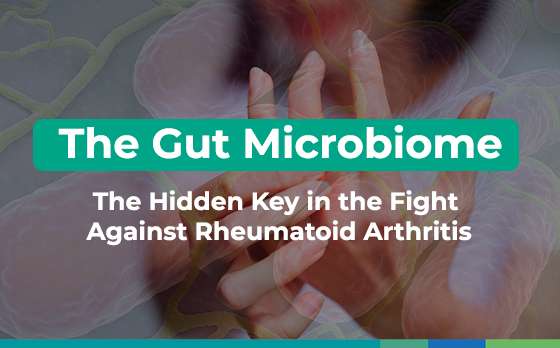Rheumatoid arthritis (RA) is a chronic autoimmune disease that primarily affects the joints, but can also have complications in other organs and systems. Although some genetic and environmental risk factors are known, the exact mechanisms that lead to the development of the disease are still under investigation.
A recent study by Rooney et al. from the University of Leeds in the UK and published in Annals of the Rheumatic Diseases explored how changes in the gut microbiome may influence the transition from a preclinical state to clinical RA.
This study monitored 124 people at risk of developing RA, 7 newly diagnosed patients and 22 healthy individuals for 15 months. Through stool and blood samples taken at five intervals, the researchers tracked microbial diversity and its relationship to key risk markers, such as anti-CCP antibodies (specific for RA) and joint pain.
The study found that people at risk of developing RA had significant alterations in their gut microbiome up to 10 months before clinical symptoms appeared. This instability in the microbiome was not observed in individuals who did not develop the disease. In addition, a relationship was identified with the bacterial family Prevotellaceae, especially Prevotella copri, which showed an increase in individuals at risk and in early stages of RA. However, the role of these bacteria appears to be complex, as some strains may be associated with disease progression, while others may not.
The study also showed that at-risk individuals have a less diverse gut microbiome compared to healthy controls. This lower diversity was associated with higher levels of antibodies and genetic predispositions, such as HLA positivity. In addition, in RA patients, the microbiome showed increased metabolic activity related to amino acids and energy production, reflecting increased inflammatory and metabolic demand.

Figure 1. Description of the study findings. Individuals at risk for rheumatoid arthritis show gut microbiome instability, reduced diversity and metabolic changes before symptoms appear. The bacterial family Prevotellaceae plays a complex role, and some strains are associated with disease progression.
These findings highlight the importance of the gut microbiome in the progression of RA and its potential as a target for diagnosis and treatment. Early interventions in the microbiome, such as dietary changes or the use of probiotics, could help stabilize the gut environment and delay or even prevent disease onset in at-risk individuals.
Although the study offers significant advances, more research is still needed to determine whether changes in the microbiome are a direct cause of RA or whether they are a consequence of alterations in the immune system. Larger-scale longitudinal studies could help identify microbial markers and more specific therapeutic strategies, opening up new opportunities for a personalized approach to RA management.
Main Reference: Rooney CM, Jeffery IB, Mankia K, et alDynamics of the gut microbiome in individuals at risk of rheumatoid arthritis: a cross-sectional and longitudinal observational studyAnnals of the Rheumatic Diseases Published Online First: 08 November 2024. doi: 10.1136/ard-2024-226362
Other References:
Holers VM, Demoruelle MK, Kuhn KA, et al. Rheumatoid arthritis and the mucosal origins hypothesis: protection turns to destruction. Nat Rev Rheumatol 2018;14:542–57. https://www.nature.com/articles/s41584-018-0070-0
Sugiyama D, Nishimura K, Tamaki K, et al. Impact of smoking as a risk factor for developing rheumatoid arthritis: a meta- analysis of observational studies. Ann Rheum Dis 2010;69:70–81. https://doi.org/10.1136/ard.2008.096487
Mankia K, Cheng Z, Do T, et al. Prevalence of Periodontal Disease and Periodontopathic Bacteria in Anti- Cyclic Citrullinated Protein Antibody- Positive At- Risk Adults Without Arthritis. JAMA Netw Open 2019;2:e195394e195394. https://jamanetwork.com/journals/jamanetworkopen/fullarticle/2735467#google_vignette
Sokolova MV, Hartmann F, Sieghart D, et al. Antibodies against citrullinated proteins of IgA isotype are associated with progression to rheumatoid arthritis in individuals at- risk. RMD Open 2023;9:e002705. https://rmdopen.bmj.com/content/9/1/e002705


